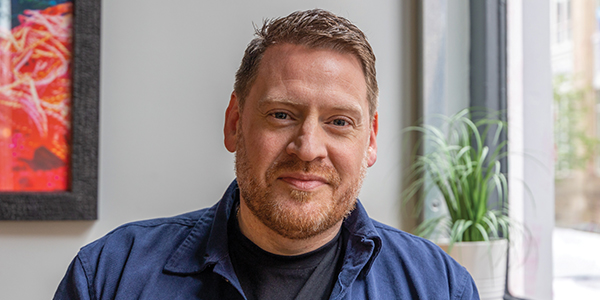Interview with: Tom Reynolds, edtech founder, EdenFiftyOne

In 2020, the UK’s education technology (edtech) market grew by 72% and is estimated to be worth around £3.5 billion, with further growth expected as schools continue to catch up after the disruption caused by the pandemic.
Someone who has entered the bustling sector is Tom Reynolds. From 2003, Tom worked in secondary English education until he left his assistant headteacher position in 2017. Since then, he has developed a unique edtech platform whilst working as a specialist leader of education.
Having always enjoyed working with people, Tom found his calling after receiving a dyslexia diagnosis.
He said: “I suppose the biggest catalyst into considering a career in education was receiving a dyslexia diagnosis a few days after completing my language and literature degree in Manchester. It felt quite serendipitous really that teaching could be an opportunity to see if I could try and bring a degree of clarity and process to English learning in a way that I could have benefited from at an earlier age.”
Tom enjoyed many successes in his head of English roles and has helped many schools and academies receive their best ever English results. However, he knew he could offer further support through a system that reduces workload for teachers and learners. It is how EdenFiftyOne was born.
“I built the original platform in Excel with a very good friend of mine from Liverpool called Chris Gettel, director of science at Shrewsbury International School in Bangkok,” Tom said. “Since building the platform with him, I’ve received investment from social mobility-minded Angel Investor, Jonny Clark. EdenFiftyOne is now fully online and fully functional.”
Its concept is impressive. Tom explains: “I wanted to develop a methodology that reduces overload for English teachers and learners. Maths and English are always referred to and compared in unison, maths is traditionally studied with a priority topic in focus until the point of assessment and this methodical process reduces overload for the teacher of maths by providing a singular focus to planning, preparation, delivery, formative assessment, marking and monitoring.
“This methodical process also simultaneously reduces overload for the learner of maths by providing them with a singular focus to demonstrate their understanding. Conversely in English, the lack of methodical process or priority focus creates constant overload for teachers and for learners.”
Tom continues: “The fundamental foundation of EdenFiftyOne is to enable English teachers and learners to focus on one thing at a time. There are four exam boards for schools and multi academy trusts (MATs) to choose from in England alone. Having multiple exam boards, different awarding bodies and curriculum changes, can confuse and complicate the process for even the most experienced practitioners.
“In my different roles, I realised every board is subservient to the same set of communication skills across reading, writing, speaking and listening. I took as many different copies as I could of different exam boards that have been produced and extracted the skills on there into three lists: reading, writing, and speaking and listening. If the skills were different then they made it onto the list, if the skills were duplicated, they went in the bin, and when I had finished I realised that regardless of exam board, curriculum type, text choice or written task, there are only 51 universal and permanent skills of reading, writing, speaking and listening within educational English.”
EdenFiftyOne cleverly clarifies, monitors, tracks and teaches the 51 universal expectations of reading, writing, speaking and listening within English. Its main benefit is reducing the ever-increasing workload for teachers.
Tom said: “It enables English teachers to have one or two key areas of focus within the lesson and therefore, one or two areas of focus within the work that is then marked or assessed. For example, if a teacher had a content focus on the characterisation in ‘A Christmas Carol’ but then a skills focus on sentence types, the teacher can then make a general comment on the content but they could choose to simply mark and assess the student proficiency in sentence type only.
“Over time, the teacher can make greater demands of the student and, of course, the formative and summative assessments will require more and more demands to be added. As it stands, however, teachers find themselves teaching and marking everything at the same time.”
Stacey Kitt, head of English at Ormiston Bushmills Academy, has utilised the platform in her department. She said: “In August 2019, we achieved our best-ever GCSE English results. EdenFiftyOne undoubtedly helped selected students to make significant progress, and as such, it played a crucial role in the record-breaking success of our English department.”
Since its launch, the edtech business is working with schools and MATs across the country. However, Tom also spotted a lucrative gap in the market overseas.
He tells Educate: “My understanding of international education is that the day after the students finish their exams in May or June, there is a period of time, perhaps four to six weeks, where middle leaders and teachers are able to reflect and refine on strategies that could be beneficial for the upcoming year.
“The relentless demands of the education system in this country, mean that even if people wanted to look at this, even if people thought it sounds great, teachers and leaders alike are not given the freedom or peace of mind, or time just to step off the wheel and to look, think and breathe.
“Even if headteachers felt empowered to enable their teachers and leaders to meet with their departments, find out what worked, what didn’t, what’s out there, and research what piece of edtech would have really helped them in teaching and learning this year, headteachers/school leaders will often have their hands tied by the uniformist and conformist nature of the multi-academy trusts they work within. Independent strategies and approaches are perhaps limited under the umbrella of the MAT model.”
The pressures and lack of time, amongst other things, can be contributing factors when it comes to schools and MATs embracing edtech. How does Tom think schools could be better supported when selecting and implementing technology?
“There has to be an improved provision for edtech reviews. I think there should be a national register that enables everybody to feedback freely, whilst being certified, and schools can go on, click on the subjects, look for the age group and then there is a register that is the ‘go-to’ that everyone refers to.”
Whether or not a Trip Advisor for edtech is launched in the near future, Tom’s 20 years of experience in English teaching roles certainly provides him with the expertise and insight to support those in the position he was once in. But looking at the curriculum as it is today, where would his focus be and what changes would he implement?
Tom said: “This may be quite divisive, but in my opinion, I think that English literature and because of the way the current English language exam is built – I think that they should be optional subjects.
“The reason for that is because very little of language or literature are about functioning adequately, competently and confidently in society. Having a curriculum that just keeps building on aspiration is all very well and good, but I believe as teachers and educationalists the first level of responsibility is on making sure that everyone can function. Cultural enrichment is a wonderful thing but students should be supported to understand the basics of communication before embracing the other elements that are currently being taught within the English curriculum.”
Find out information about EdenFiftyOne by visiting: www.edenfiftyone.com








